Spelling: How Much Time Should I Spend?
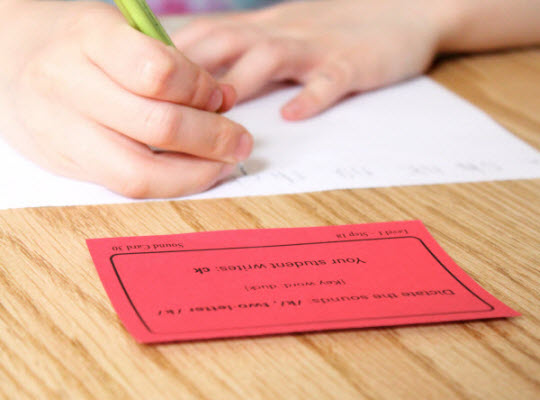
If you’re wondering how much time you should spend on spelling lessons, you aren’t alone! This is one of the most frequently asked questions about the All About Spelling program.
Fortunately, there is a really simple answer that works in most situations.
How Much Time Should I Spend?
I generally recommend spending 20 minutes a day, five days a week on spelling lessons.
Of course, this general recommendation may not fit your family’s situation perfectly. You may need to customize the length of your lessons to fit your child’s specific needs.
But that’s the great thing about All About Spelling—it’s easy to customize. Here are a few more things to think about as you plan your day:
- Take your child’s age and attention span into consideration. If your child is young, has a hard time sitting still, or is just starting out in spelling, you may want to start with as little as ten minutes per day. You can gradually build up the time as your child matures and his attention span grows.
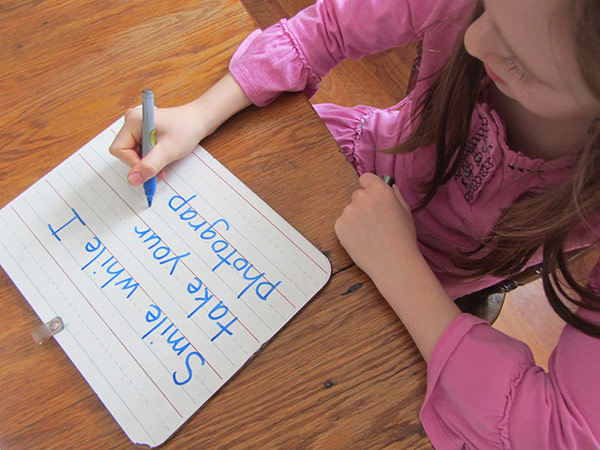
- Short lessons every day are more effective than longer, less-frequent lessons. In a short lesson, your child’s attention is less likely to wander, and you’ll find that you can accomplish more when your student is actively engaged in the lesson. Keep the lessons upbeat and fast-paced to hold the child’s interest. Even if you are working with an older child who can focus for a longer period of time, 20 minutes is all you need to review old material, teach the new concept, and write several sentences from dictation. Students can only absorb so much new information at once, and then the rest isn’t retained.
Sometimes we hear from moms whose kids balk at spelling lesson time, only to find out that the mom is trying to push through multiple lessons in one sitting, or is spending an hour on extra lessons in order to “catch up.” Even if they were just as effective as short lessons, long lessons make spelling seem like drudgery. As much as possible, we want to keep lessons light and fun.
- Remember that you don’t need to complete an entire lesson in a day. In fact, sometimes a student will need a whole week to complete a lesson. The speed at which your child masters al esson depends on the student’s age, attention span, prior experience, and the concepts being taught. The All About Spelling program is completely flexible and customizable so you can breeze through sections that are easy for your student and spend more time on difficult concepts.
If you’re new to All About Spelling and are wondering what a lesson looks like, download this free lesson sample from Level 2, Lesson 21. Each lesson teaches one new concept, and in this lesson, students learn words with the sound of /ar/ as in farm.
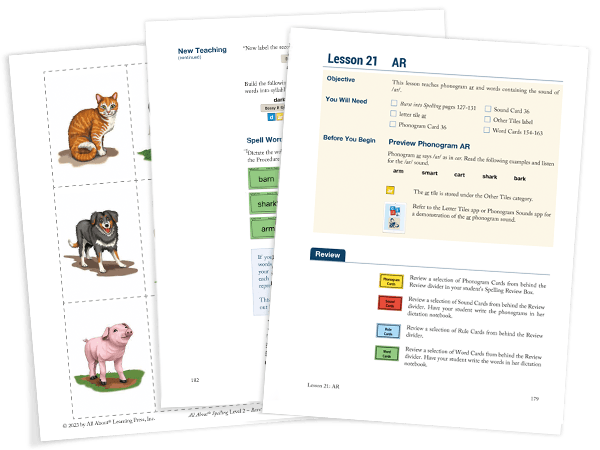
There are three main sections in each lesson: Review, New Teaching, and Reinforcement. If you can’t get through the entire lesson in a day, simply mark the page to hold your spot. The next day, start with a quick review of the flashcards (Phonogram Cards, Sound Cards, Rule Cards, and Word Cards), and then pick up where you left off the previous day.
- Use a timer. After you’ve determined the best length of time for your situation, set a timer at the beginning of the lesson. This will help you stay on track and not make the lesson go on too long. Your child will be encouraged to stay focused because he knows that the lesson will end, and you won’t be tempted to keep pushing past the time you agreed upon.
The Bottom Line
The most important thing to remember when planning spelling lessons is to keep them “short, sweet, and consistent.” Your child’s brain is like a muscle, and consistent exercise does much more to develop muscle than occasional big bursts of energy. And shorter lessons keep your child coming back for more!
Short, effective lessons are just one of the ways we make spelling easy! Download my free e-book, “Six Ways We Make Spelling Easy,” to discover six powerful features of All About Spelling that will revolutionize your teaching!
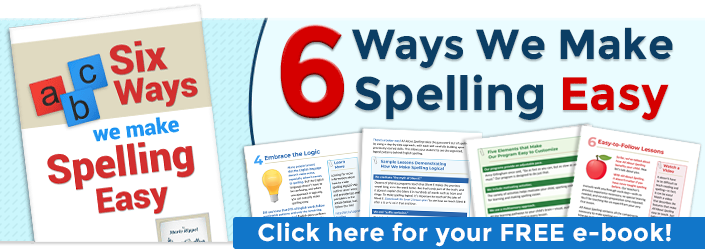
Photo credit: Jamie at The Unlikely Homeschool and Michelle at Delightful Learning




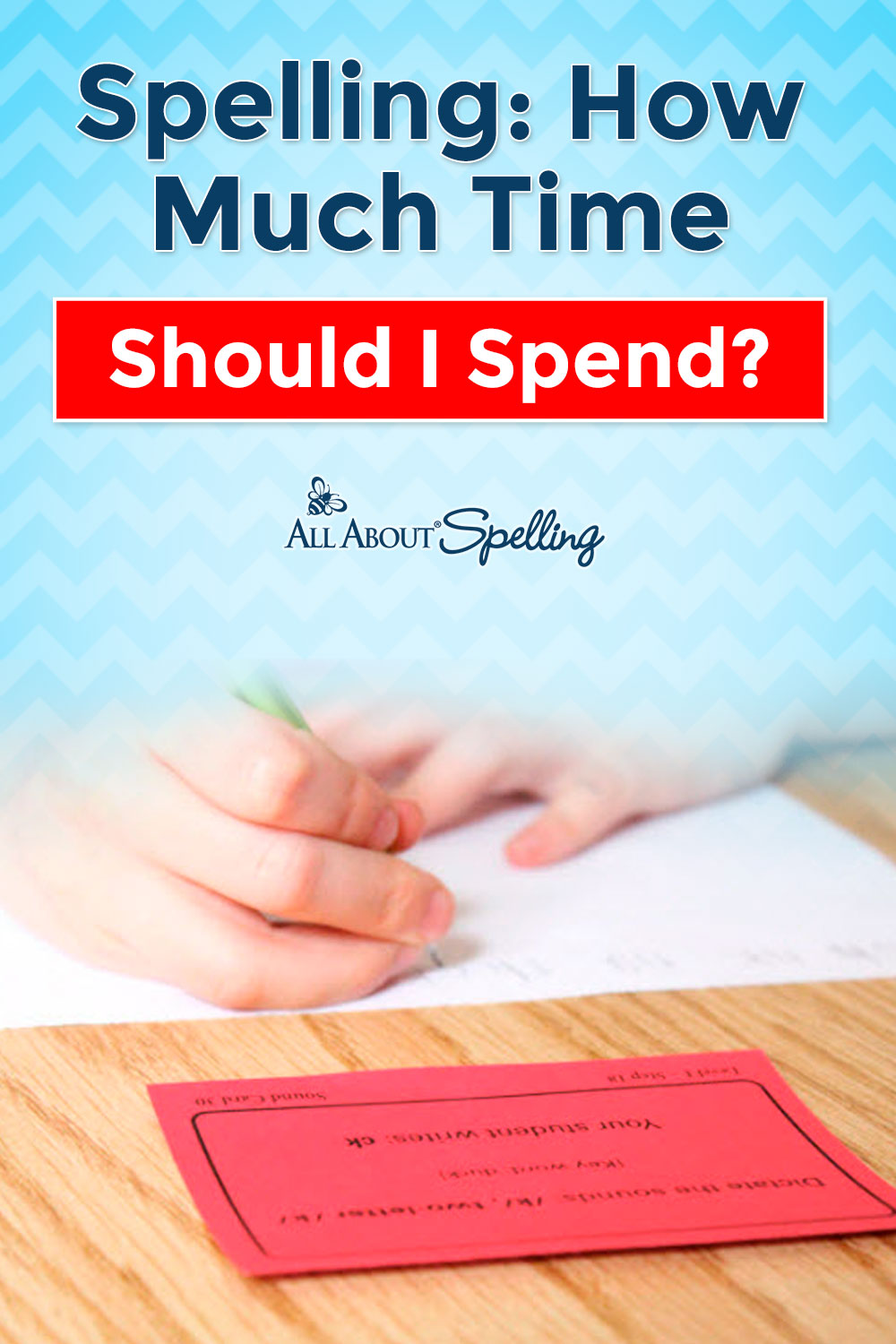




Gale
says:I’ve found that, doing a lesson a week, I only need 20 minute lessons on the day the major concept of the chapter is taught. The rest of the week, 10 minute lessons work great for review.
If multiple concepts are taught (ie, there are multiple sections teaching different concepts), I will sometimes need a second 20 minute day. But I don’t take 20 minutes to just practice the words that reinforce a concept, or, towards the end of the week, to write a few sentences with those words (I don’t usually do all the sentences though).
Robin
says: Customer ServiceGale,
Another option would be to work 20 minutes a day on spelling and move on to a new lesson. Many children do great working on two lessons or so per week. Of course, if your child is young, or you have other reasons to prefer to move more slowly through a level, sticking to one lesson per week is fine too!
Theresa
says:Great content. I’m so in love with these materials.
Robin E.
says: Customer ServiceAwww, thank you, Theresa!
Hedwig
says:Have used that method much and it help me. Thanks
Sonya Price
says:We are currently using Abeka 2 phonics and not really using a spelling curriculum. She did not do well with the Abeka spelling. I have tried to stick with Abeka but it is just too complicated for us. We started it last year about this time. My 8 year old took the placement test for both AAS & AAR. She scored well on the reading and should start with level 3. She’s a good reader but struggles in spelling. Should I start her on level 1? I also have a 5yo who knows about about 3/4ths of the sounds of the alphabet. Do you suggest the reading level 1 before starting spelling? Thanks so much!
Robin E.
says: Customer ServiceSonya,
We have a placement test for spelling, but most struggling spellers need to start with Level 1.
All About Spelling is a building block program with each level building upon the previous one. The rules and concepts learned in Level 1 are applied in Level 2, and then those are applied in Level 3, and so on. Placement for spelling is based on the student’s knowledge of spelling rules and concepts rather than grade level, reading level, or the words a student has memorized.
For example, we find that many students simply memorize easy words like “cat” and “kid” but have no idea why one uses a C and the other uses a K, or that the same rules that apply to these words also apply to higher-level words such as “concentrate.” Other students switch letters or leave out letters entirely. This usually occurs because they don’t know how to hear each sound in the word. Level 1 has specific techniques to solve these problems.
However, Level 1 will not take a full year to complete and it won’t be long until your student is in Level 2, but you will see improvement in her spelling in that short time!
As for your 5-year-old child, yes, we do recommend a student complete All About Reading Level 1 (or the equivalent reading level) before starting All About Spelling. We discuss this in our The Right Time to Start Spelling article.
The first step in All About Spelling Level 1 covers the multiple sounds for the alphabet, and then the second and third steps focus on phonological awareness skills. The concepts in these three steps are taught gradually throughout the first level of All About Reading, so that is one reason why we suggest doing AAR 1 first. Also, many beginning readers are not ready for much writing yet, or the deeper logic that spelling requires, which can be other reasons to wait.
Also, go over the All About Reading Level 1 placement test with your 5-year-old to be sure this child is ready for Level 1. While some 5-year-olds are ready for Level 1, many still need to focus on the Reading Readiness Skills essential for reading success. Knowing letter sounds is just one of those skills.
I hope this helps, but let me know if you have additional questions or need more help with placement.
Sarah
says:I am currently mid way through AAR2 with my 8yo daughter who I highly suspect has some aspects of Dyslexia and would like to get her assessed by an educational psychologist.
The lessons are challenging for her and sometimes 15 mins is enough. She dislikes the practice for fluency pages at the end of some lessons. Any ideas for how to approach these better? I’m guessing it’s good for her to slowly make her way through them instead of just doing a couple of lines and then skipping to the next lesson? But if that’s all I have left to do the the next lesson is review and then more practice words, which equals a whole lot of reading for her in one lesson and not a whole lot of ‘fun’. She loves the games and often has a more positive attitude to learning where they are involved.
The reason I mention this all here, is because I haven’t done any spelling tuition with her yet, as I don’t want to overwhelm her brain. She struggles to focus and tires quickly. So if I add another subject into her morning it might be too much. Do you have any suggestions as to whether 1. I incorporation ASS1 now or wait. 2. How I might incorporate it into her morning without adding more to her sense of overwhelm?
Thanks :)
Sarah
Robin E.
says: Customer ServiceSarah,
Your daughter sounds a lot like my daughter. When she was 8, we typically did reading for just 15 minutes a day because she would tire so quickly. But the consistency day in and day out pays off. This A Typical Day with All About Reading describes how I stretched a lesson out over a week to allow her time to read everything in the lesson.
One thing I did is spread the fluency practice sheets out over a few days. We would start on the fluency sheet right after doing the card review. I would have my daughter read the fluency sheet for 3 to 5 minutes, and then we would move on to other things in the lesson.
In addition, we have lots of ideas on our 16 Ways to Make Practice Sheets Fun blog post that will help make the fluency practice sheets more activity and game-like.
I do recommend starting All About Spelling now. The benefits of doing it will be worth it. Spelling approaches words from the opposite direct (encoding instead of decoding) and that is often very helpful for students that are struggling with reading. Also, AAS 1 will review words, rules, and concepts she learned in AAR 1, and such review will be helpful. She will need to read every word she spells to ensure she spelled it correctly, so that will provide additional reading practice. Lastly, often children that struggle to gain fluent reading actually find spelling easier, especially in the first couple of levels. My daughter certainly did and that boosted her confidence.
While we generally recommend 20 minutes a day of spelling, like with reading you can shorten it to better fit your child’s needs. Even 10 minutes a day, done five days a week, will lead to progress.
With my daughter, I separated reading and spelling time by doing something completely different between them. We would have a snack, or go water some plants outside, or work on a hands-on project for science or history, or maybe even just clean something. Just 20 or 30 minutes of something to give her mind a rest was all that was needed for her to be ready to go back to work.
I hope you find this helpful. My daughter is 14 now. She finished All About Reading level 4 when she was 11, and now she happily reads whatever catches her interest!
Let me know if you have questions or need additional help.
Jocelyn Estes Abyad
says:Realizing I’ve been doing one big lesson each week and perhaps I should change it to multiple smaller lessons as you suggest
Robin E.
says: Customer ServiceJocelyn,
Many students have better progress and retention by doing short daily lessons. You could try it and see if it works better for your student.
Denise
says:I love the ease of teaching AAS as a mom. My 8 yr old son struggled with spelling so much despite he knows all the phonics from montessori growing up. AAS done a magic! We started with AAS level 1 and now we are completing level 3, all within 7 months. I saw how this program has helped him and we plan to continue to use AAS with all levels! I already recommended to all the moms I know as I am very impressed with All About Spelling!
Robin E.
says: Customer ServiceWow, Denise! Your son has made such amazing progress in such a short time. Great work!
Holly Rutherford
says:I love the recommendation of 20 min. at a time. I have definitely learned that gives students time to absorb and make connections with what they are learning.
Robin E.
says: Customer ServiceGood point, Holly. Keeping lessons short allows students to make the most of the lesson!
Amber
says:Love the flexibility of AAS. Shorten or lengthen the lesson time to fit the student’s prime learning zone. Spelling doesn’t have to be dreaded!
Robin E.
says: Customer ServiceSuch great points, Amber! The flexibility to adapt to each student’s needs is one of the reasons All About Spelling is so effective.
Sally
says:We struggled with how much time to spend on a Lesson. The timer works well for both of us.!
Robin E.
says: Customer ServiceI’m glad to hear the timer is working well for both of you, Sally! It is such a useful tool for school.
Amy
says:This is really helpful!
Sherry
says:The idea of using a timer is great! I have a reluctant speller, so a visual that gives her motivation and hope for the end to come, may help her see it through to the end!
Robin E.
says: Customer ServiceI’m glad you like the timer idea, Sherry! It does work very well for many students, knowing that the lesson won’t go on forever.
Roxana
says:Using a timer is a brilliant idea! It allows the student(s) to give their all for just a short amount of time and feel confident in their accomplishments once the timer goes off.
Thank you for sharing your advice
Robin E.
says: Customer ServiceYou’re welcome, Roxana!
Rahul Vasanth R
says:It has been quite helpful to do short sessions of around 20 minutes. My kid and me manage to sometimes squeeze in a quick session in our schedule and complete a part of a step, instead of planning to complete one full step in each session.
Robin E.
says: Customer ServiceI’m pleased to hear that the short lessons are working out so well fo you, Rahul!
Connie
says:This is our first year homeschool and I’ve started using this curriculum to fill in gaps for my kids. It’s even helped me understand spelling rules I didn’t know
Sara Hagy
says:This is my first year using AAR & AAS. My second grader recently finished her lessons for AAR 2 and AAS 2. My kindergartener is enjoying the pre-reading level, but I made the mistake of starting him on AAS 1 too soon. He is learning and improving, but he currently does not look forward to spelling. He has a language delay, sensory processing disorder, and I believe he has a poor working memory and comprehension. The steps take many days for him to complete. He becomes frustrated and discouraged easily. He also doesn’t like the fact that his sister has more stickers on her progress chart. I have started using a timer with the spelling lessons, so we don’t go too long. I wonder if I should finish AAS 1 with him or discontinue it until he has completed AAR 1?
Robin E.
says: Customer ServiceSara,
We recommend waiting until a student has finished All About Reading level 1 before even beginning All About Spelling. Spelling is more difficult than reading, so having a good foundation in reading helps make learning to spell easier.
If your student was doing well in AAS, it would be okay to go ahead with it since you have already started, but since he is having difficulties, I recommend stopping All About Spelling. When he finishes AAR level 1, then restart AAS 1 at the beginning. He will likely move through the steps that are review quickly, but starting at the beginning again will ensure nothing important was forgotten during the break.
I hope this helps. Let me know if you have further questions.
Michelle Kramer
says:We do about 10 minutes a day and my first grader is loving it!
Robin E.
says: Customer ServiceGreat to hear, Michelle!
Jennifer You
says:I love the idea of a timer!
Karen McLain
says:Thank you for the great ideas!
Charissa Reed
says:Good to know this info as my son has a short attention span.
Robin E.
says: Customer ServiceCharissa,
Yes, short attention spans are especially benefited from short lessons.
Ellery
says:Excellent advise.
Ellery
Robin E.
says: Customer ServiceThank you, Ellery.
Michael's Mom, Patricia
says:This program is really working for my son, who has dyslexia! I can’t tell you what it has done for his confidence. On level 2 and looking forward to growing to Level 3!
Robin E.
says: Customer ServiceI’m so happy to hear that your son is gaining confidence, Patricia!
Ana
says:Starting on AAR 2 and we are having so much fun while learning!
Kelly Keefer
says:The unnecessary learning of sight words has led us to AAS
Allison
says:My daughters have improved so much this year in AAR1. I can’t wait to start Pre Reading with my 5 year old when it comes :-)
Robin E.
says: Customer ServiceIt’s wonderful to hear how well your daughters have been doing with All About Reading, Allison! Thank you.
Carolsue
says:I was always a good speller in school, so it’s frustrating that my kids aren’t and don’t even seem to try!
Robin E.
says: Customer ServiceSpelling comes very easily and naturally for some learners, Carolsue, and it is near impossible with traditional the weekly spelling lists approach for others. Once spelling is broken down to make sense, these students almost always start having success. Check out our 7 Ways to Make Spelling Logical blog post.
Danielle Fisher
says:I love that the lessons are short but impactful.
Robin E.
says: Customer ServiceWe agree, Danielle!
N Laine
says:Thanks for the info!
Robin E.
says: Customer ServiceYou’re welcome!
Judith Martinez
says:These are helpful guidelines. I’ve tried really hard to keep our lessons short.
Christina Holbrook
says:Love you spelling and reading curriculums!
They make teaching and learning so enjoyable!